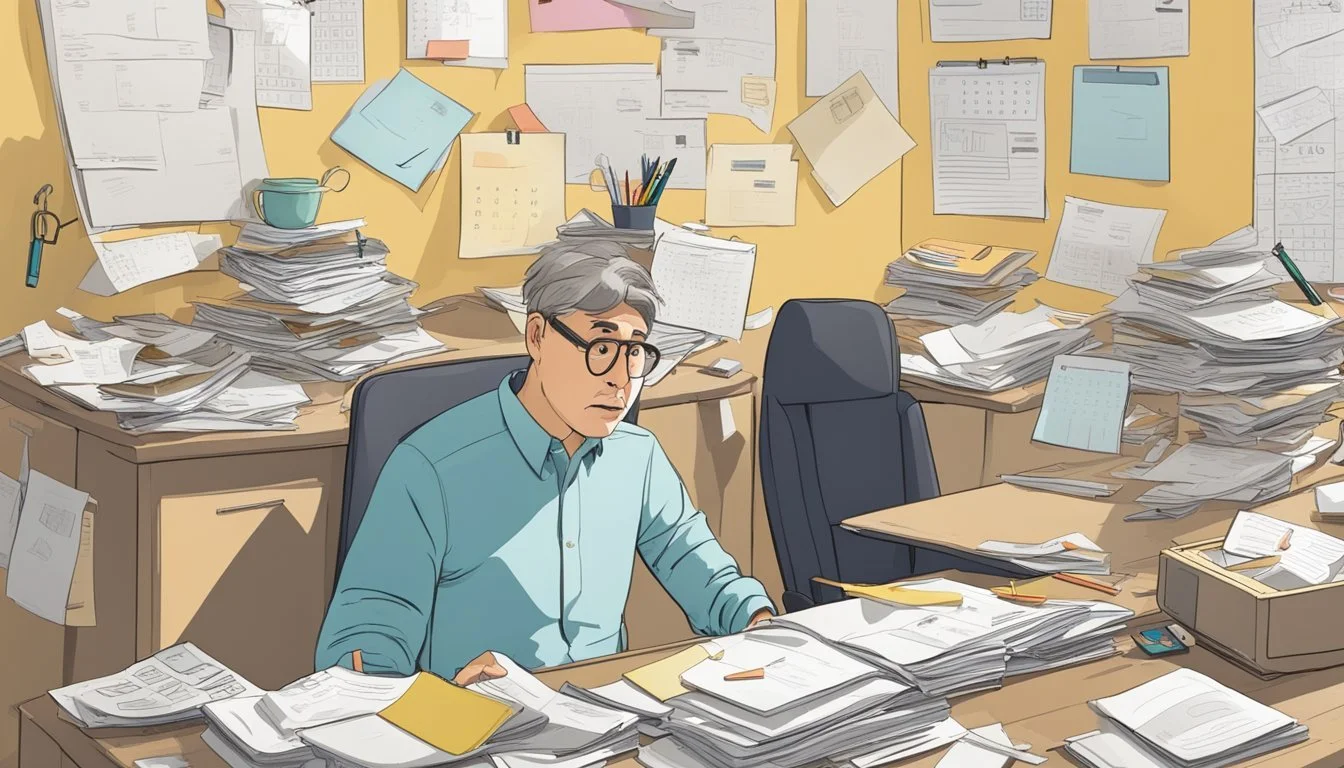Shock Jock's Struggle: Howard Stern's Battle with OCD Revealed in New Interview
Howard Stern, the renowned radio personality and self-proclaimed "King of All Media," has long been known for his controversial and boundary-pushing content. Behind the scenes, however, Stern has been quietly battling a personal struggle that affects millions of people worldwide: Obsessive-Compulsive Disorder (OCD).
Despite his public persona as a fearless shock jock, Stern's OCD has significantly impacted his daily life and career. The radio host has openly discussed his challenges with the disorder, including intrusive thoughts, repetitive behaviors, and an overwhelming need for control. These symptoms have influenced everything from his personal relationships to his on-air performances.
Stern's journey with OCD offers a unique perspective on the disorder, showcasing how even those in high-pressure, public-facing careers can grapple with mental health issues. His willingness to discuss his experiences has helped reduce stigma surrounding OCD and encouraged others to seek help for their own struggles.
Howard Stern's Rise to Fame
Howard Stern's journey to becoming a radio icon spanned decades of hard work and controversy. His unique style and willingness to push boundaries transformed him from an unknown DJ into the self-proclaimed "King of All Media."
From Humble Beginnings to 'King of All Media'
Howard Stern began his radio career in 1975 at a small station in Massachusetts. He quickly developed his distinctive on-air persona, blending humor with provocative content. Stern's big break came in 1982 when he joined WNBC in New York City.
His brash style and controversial segments drew both criticism and a growing audience. By the mid-1980s, Stern's show was syndicated nationally, reaching millions of listeners. He coined the term "King of All Media" as his influence expanded beyond radio to television, books, and film.
Stern's 1993 autobiography "Private Parts" became a bestseller and was later adapted into a successful movie. This multi-media success solidified his status as a major entertainment figure.
The Evolution of 'The Howard Stern Show'
'The Howard Stern Show' evolved significantly over the years. In its early days, it was known for shock value and pushing the boundaries of acceptable content. Stern's interviews with celebrities and controversial figures became a hallmark of the program.
The show faced frequent fines from the FCC for indecent content. This battle with censorship became a central theme, attracting listeners who appreciated Stern's rebellious stance. As the show grew in popularity, it incorporated more diverse segments and expanded its cast of regular contributors.
In 2006, Stern moved his show to Sirius Satellite Radio, now SiriusXM. This transition allowed for uncensored content and longer broadcasts. The show continued to evolve, featuring in-depth interviews and discussions on a wide range of topics.
Understanding Obsessive-Compulsive Disorder (OCD)
Obsessive-Compulsive Disorder (OCD) is a mental health condition characterized by persistent, intrusive thoughts and repetitive behaviors. It affects millions of people worldwide, causing significant distress and interfering with daily life.
Defining OCD
OCD involves two main components: obsessions and compulsions. Obsessions are unwanted, recurrent thoughts, urges, or images that cause anxiety or distress. Common obsessions include fears of contamination, doubts about safety, or unwanted aggressive or sexual thoughts.
Compulsions are repetitive behaviors or mental acts performed to reduce anxiety or prevent feared events. These may include excessive hand washing, checking locks repeatedly, or mental rituals like counting or praying.
OCD symptoms must be time-consuming (taking more than an hour daily) or significantly impact a person's life to meet diagnostic criteria. The condition often begins in childhood or adolescence and can persist into adulthood if left untreated.
The Impact of OCD on Individuals
OCD can severely affect a person's quality of life. It may interfere with work, school, relationships, and daily activities. People with OCD often experience:
Significant time spent on obsessions and compulsions
Difficulty concentrating on tasks
Social isolation due to embarrassment or fear
Relationship strain from OCD-related behaviors
Physical health issues from excessive rituals
OCD can lead to depression, anxiety disorders, and substance abuse. Many individuals with OCD recognize their thoughts and behaviors as irrational but feel unable to control them. This awareness often adds to their distress and frustration.
Treatment options, including cognitive-behavioral therapy and medication, can help manage OCD symptoms and improve quality of life. Early intervention is crucial for better outcomes.
Stern's Personal Journey with OCD
Howard Stern's battle with Obsessive-Compulsive Disorder (OCD) has been a significant part of his life. The renowned shock jock has openly discussed his struggles and efforts to manage the condition.
Opening Up About the Struggle
Stern revealed his OCD diagnosis on his radio show and in various interviews. He described experiencing intrusive thoughts and compulsive behaviors that interfered with his daily life.
The radio host mentioned specific rituals, such as turning newspaper pages in a certain way before reading columns. These compulsions often consumed significant time and energy.
Stern's OCD also manifested in other areas. He reported experiencing back pain, which he believed was connected to his mental health struggles.
Strategies and Management
To address his OCD, Stern turned to psychotherapy. He credited this treatment with helping him gain control over his symptoms and improve his overall well-being.
The shock jock embraced the teachings of Dr. John Sarno, focusing on the mind-body connection. This approach helped Stern manage his back pain, which he viewed as related to his OCD.
Stern made efforts to resist indulging in OCD rituals. He worked on breaking patterns of compulsive behaviors, recognizing their impact on his life.
Through therapy and self-awareness, Stern developed coping mechanisms. He learned to challenge intrusive thoughts and reduce the power of his compulsions.
Legal and FCC Challenges
Howard Stern's career has been marked by numerous clashes with regulatory bodies and legal entities. His controversial content pushed boundaries and sparked debates about free speech and indecency in broadcasting.
FCC Regulations and Indecency Battles
The Federal Communications Commission (FCC) frequently targeted Stern's show for alleged indecency violations. Between 1990 and 2004, the FCC issued fines totaling $2.5 million to radio licensees airing Stern's material. These fines were the highest amount levied against any American radio show at the time.
Clear Channel Communications, once the nation's largest radio chain, dropped Stern from six stations in 2004. This decision came after the FCC announced a $495,000 fine for "indecent" content on his show.
Stern's battles with the FCC became a central theme of his career. He often used his platform to criticize the commission's policies and what he perceived as censorship.
Lawsuits and Legal Hurdles in Stern's Career
Throughout his career, Stern faced various lawsuits and legal challenges. These ranged from defamation claims to contract disputes with radio stations and networks.
One notable case involved Stern's former employer, CBS Radio. In 2006, CBS sued Stern for $500 million, alleging he had breached his contract by failing to disclose his plans to move to satellite radio.
Stern's legal battles often centered on First Amendment rights. He positioned himself as a champion of free speech, arguing that his content, while controversial, was protected under the Constitution.
These legal challenges shaped Stern's public persona and influenced his decision to move to satellite radio, where FCC regulations did not apply.
Fan Engagement and the Digital Transition
Howard Stern's ability to connect with listeners has been a key factor in his enduring success. His show's evolution paralleled the rise of new media platforms, reshaping how fans interact with content.
Building a Loyal Fanbase
The Howard Stern Show cultivated a devoted audience through its unfiltered content and personal approach. Stern's willingness to share intimate details of his life created a sense of closeness with listeners.
This openness fostered a community feel among fans, who often shared inside jokes and catchphrases. The show's regular cast of characters and recurring segments gave fans consistent touchpoints to engage with.
Stern's interviews with celebrities revealed new sides of public figures, further drawing in listeners. His confrontational style and probing questions often led to headline-grabbing moments that kept fans tuning in.
Adapting to the Digital Age
As technology evolved, so did The Howard Stern Show's approach to fan engagement. The move to satellite radio in 2006 allowed for uncensored content and expanded programming.
Stern embraced social media platforms to connect with fans outside of show hours. The show's official accounts on platforms like Twitter and Instagram share clips and behind-the-scenes content.
Reddit became a hub for fan discussions, with dedicated subreddits analyzing show segments and sharing favorite moments. This online community extended the show's reach beyond its broadcast hours.
The introduction of video content through SiriusXM's app added a new dimension to the listening experience. Fans could now see studio interactions and guest interviews, enhancing their connection to the show.
Stern's Cultural and Social Impact
Howard Stern's influence extends far beyond radio, reshaping entertainment and public discourse. His bold approach challenged norms and sparked debates on free speech and censorship.
Shaping Radio Entertainment
Howard Stern revolutionized radio with his shock jock style. He pushed boundaries on KLSX-FM in Los Angeles and other stations, attracting massive audiences. Stern's unfiltered conversations and controversial segments redefined morning radio.
His success inspired numerous imitators, changing the landscape of talk radio. Stern's format blended humor, celebrity interviews, and personal revelations. This approach created a more intimate connection with listeners.
Stern's impact on radio ratings forced competitors to adapt. His show became a cultural touchstone, often making headlines and driving conversations.
Influence Beyond the Airwaves
Stern's influence transcended radio, impacting broader entertainment and social spheres. His bestselling books and movie adaptation expanded his reach. Stern's candid discussions of taboo topics helped normalize conversations about sex and relationships.
His battles with the FCC brought debates about censorship and free speech to the forefront. Stern became a symbol of First Amendment rights in broadcasting. His move to satellite radio in 2006 marked a shift in media consumption patterns.
Stern's interviewing style, known for eliciting revealing responses from guests, influenced celebrity journalism. His frank discussions of personal struggles, including OCD, helped destigmatize mental health issues.
Howard Stern Show Business Strategies
Howard Stern's business acumen has been instrumental in his longevity and success in the radio industry. His strategic moves in contract negotiations and ability to monetize controversy have set him apart from other radio personalities.
Navigating Contracts and Media Mergers
Stern's contract negotiations have been pivotal in his career trajectory. In 2004, he signed a landmark $500 million deal with Sirius Satellite Radio, revolutionizing his earning potential. This move coincided with the merger between Sirius and XM, creating a larger platform for his show.
Stern's agent, Don Buchwald, played a crucial role in these negotiations. Their partnership, spanning decades, secured Stern's position as one of the highest-paid radio personalities.
In 2015, Stern inked another lucrative contract with SiriusXM, reportedly worth $90 million annually. This deal further solidified his status in the radio industry.
Monetizing Controversy
Stern's controversial content has been a key factor in his commercial success. His shock jock persona attracted advertisers seeking to reach his dedicated audience.
He leveraged his provocative style to generate buzz and maintain high ratings. This strategy helped him command premium advertising rates and secure loyal listeners.
Stern's ability to push boundaries while avoiding major legal repercussions showcased his understanding of FCC regulations. He often toed the line between shocking content and outright obscenity, keeping audiences engaged without risking his show's broadcast license.
His controversial interviews and segments became cultural touchstones, further increasing his show's value to advertisers and media companies.
Security and Privacy Concerns
Howard Stern's show faced challenges in safeguarding listener data and communications. The program implemented measures to protect sensitive information and enhance account security.
Protecting User Information
Stern's team prioritized safeguarding usernames, email addresses, and other personal details. They created a robust Privacy Policy outlining data handling practices. The User Agreement specified how information would be used and protected.
Listeners were encouraged to use anonymous usernames when interacting with the show. This helped maintain privacy while participating in on-air discussions or online forums.
The show's website employed encryption to secure data transmissions. Regular security audits identified and addressed potential vulnerabilities.
Adopting Two-Factor Authentication
To strengthen account security, Stern's digital platforms implemented two-factor authentication. This extra layer of protection helped prevent unauthorized access.
Users could enable 2FA through authenticator apps or SMS codes. Backup codes were provided as an alternative verification method.
The system prompted users to verify their email addresses. This ensured account recovery options remained current.
Password reset procedures were enhanced. Users received secure reset links via email to change compromised credentials.
Staff received training on security best practices. This helped maintain a culture of data protection across the organization.








